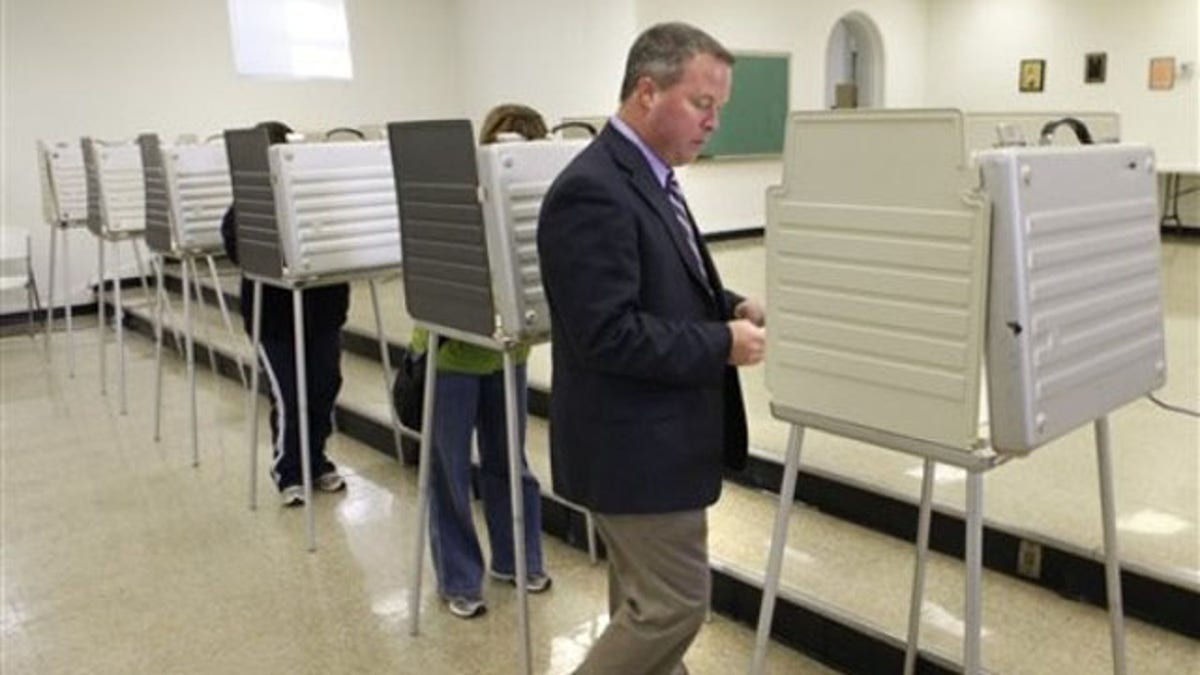
Shown here is ex-Rep. Steve Driehaus as he walks to a booth to vote in Covedale, Ohio, on Nov. 2, 2010. Driehaus lost the election. (AP)
In a case that could test the bounds of free speech, a former Democratic congressman has been allowed to proceed with his lawsuit against a prominent pro-life group that he claims contributed to his election defeat by spreading falsehoods about his record on abortion issues.
A federal judge in Ohio ruled Monday that former Rep. Steve Driehaus' defamation suit against the Susan B. Anthony List can go forward. The former Ohio congressman claims the group "disseminated lies" about him, effectively costing him his job -- as well as inflicting "reputational" and "economic" harm.
The complaint stems from statements and advertisements claiming Driehaus, who considers himself a pro-life lawmaker, voted for taxpayer-funded abortion when he backed the federal health care overhaul.
But the case raises apparent free-speech concerns, considering politicians frequently endure fierce and sustained criticism from multiple groups in the heat of a campaign and, from time to time, lose because of that criticism. Even the American Civil Liberties Union of Ohio filed a brief on a related, but separate, case last fall arguing that "the people have an absolute right to criticize their public officials."
Emily Buchanan, director of the Susan B. Anthony List, said the case could have a chilling effect on speech.
"The claim of defamation is outrageous. Driehaus is a public official, and we should be able to criticize him," she told FoxNews.com. "And all of this debate should be taking place in the public square. A court or a judge should not be determining" a dispute over abortion policy.
However, the ex-congressman claims he's going after the pro-life group because, according to him, they crossed the line and lied.
"The First Amendment is not and never has been an invitation to concoct falsehoods aimed at depriving a person of his livelihood," his original complaint said.
His attorney, Paul De Marco, told FoxNews.com that liars can't "hide behind the First Amendment."
While libel and defamation law protects most speech when it comes to public officials, it does not necessarily protect false speech.
As a former public official, Driehaus would likely be required to meet rigorous tests showing the group made false statements and was reckless in doing so. His lawyer said he's prepared to meet those tests.
"I don't know what other public officials decide to put up with, but Steve Driehaus decided he wasn't going to put up with lies that went to the heart of his core beliefs and damaged his reputation," De Marco said.
The congressman's original complaint cited statements dating back to August about his record on abortion. Among them was a set of billboards the Susan B. Anthony List planned to put up in October claiming he voted for "taxpayer-funded abortion." At the time, Driehaus filed a complaint with the state election board over the billboards, which did not go up, claiming they broke a state law prohibiting false statements. That battle dragged on until, after the election, Driehaus dropped the complaint and instead filed the defamation suit.
The Susan B. Anthony List argues that its statements were true and, besides, qualified as "protected opinion."
Whether the health care law at any point provided for taxpayer-funded abortion is indeed a matter of fierce debate. Driehaus cited the fact that the law and a related executive order stated that taxpayer funding could not go to abortion coverage. The law also requires policy holders under subsidized plans who seek abortion coverage to pay for that coverage themselves.
But the Susan B. Anthony List pointed in part to a government study last year that found the health care law did not explicitly prohibit high-risk insurance pools from covering abortions with federal money.
The high-risk pools are meant to help those denied coverage until the broader provisions of the law go into effect in 2014. Though the Obama administration and state governments deny it, some groups have claimed abortion could be covered through those pools.
In his latest ruling, Judge Timothy Black wrote that the ex-congressman has so far been able to "produce significant evidence" that the Susan B. Anthony List's statements are false. The judge, who also struck down a challenge to Ohio's false statement law, rejected the Susan B. Anthony List's claims about its abortion statements.
Black wrote in his opinion that voting for a bill that might have a loophole allowing for abortion coverage "is entirely different from providing for 'taxpayer funded abortion,'" as the Susan B. Anthony List claimed of Driehaus' voting record.
"The express language of the (health care law) does not provide for taxpayer funded abortion," he wrote. "That is a fact, and it is clear on its face."




